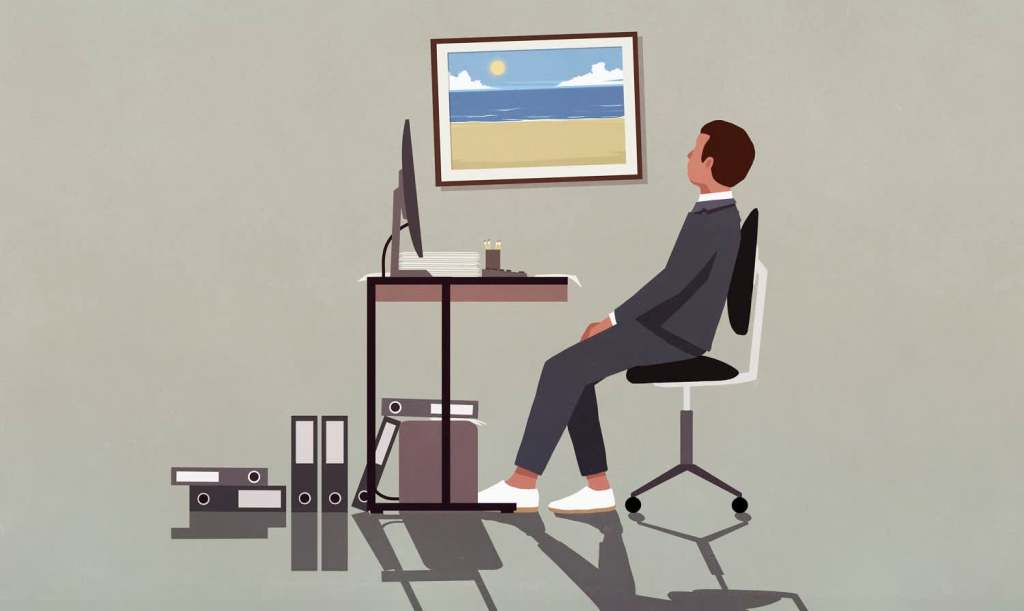Life in lockdown ain’t so bad. After all, the commute is much faster, you can spend all day in your pyjamas, and eat all the snacks you want without anyone judging you or expecting you to share.
However, working from home also comes with its drawbacks. With your office now in your living room or bedroom, there’s no clear distinction between work and the rest of your life. You spend pretty much all your time in the same space, doing the same things.
Couple this with the increasing trend of ‘work creep’ — the need or expectation to be always ‘on’, answering calls or emails well after work hours, checking to make sure something has been delivered properly — and two recent surveys have found that our mental health is declining.
Here’s what the latest data shows and what you can do about it.
Work creep
Amy Zadow, a researcher at the University of South Australia looking at mental health in the Australian higher education sector, has found that out of hours communication is rife across the sector — and it’s taking a toll on staff.
Having surveyed more than 2200 academics and employees across 40 universities, Zadow’s team found that the non-stop nature of modern work is having a negative impact on stress, work-life balance, health, and sleep in the university sector.
“Although the project team surveyed university employees, this is likely to reflect a society-wide problem of digital communication out-of-work hours,” Zedow wrote.
“An Australia Institute survey last year showed Australians were working 5.3 hours of unpaid overtime on average a week, up from 4.6 hours the year before”.
The pandemic has made working from home a reality for all non-essential workers and this appears to have worsened the situation of work-life imbalance.
They found that amongst staff,
- 21% of respondents had supervisors who expected them to respond to work-related texts, calls and emails after work;
- 55% sent digital communication about work in the evenings to colleagues;
- 30% sent work-related digital communication to colleagues on the weekends, while expecting a same-day response.
Employees who had supervisors expecting them to respond to work messages after work, compared to groups who did not, reported higher levels of psychological distress (70.4% compared to 45.2%) and emotional exhaustion (63.5% compared to 35.2%). They also reported physical health symptoms, such as headaches and back pain (22.1% compared to 11.5%).
In organisations where employees felt they had to respond to work messages out of hours, higher levels of psychological distress were reported compared with those who didn’t
These people also report higher levels of emotional exhaustion and physical health symptoms.
Lockdown blues
According to another survey, conducted by the Australian Bureau of Statistics, one in five Australians are reporting high or very high levels of psychological distress linked to the COVID-19 pandemic.
The survey sought to understand the impact on households of the previous Victorian lockdown. It found that the recent outbreak led to a surge in psychological distress, with almost a third of people in the state reporting feelings associated with depression and anxiety, compared with 18% in the rest of Australia.
It also found that 28% of residents in Sydney, just before the lockdown was announced, had reportedly felt ‘nervous’ in the previous weeks. This is the highest level recorded in six months, though not as high as the 45.7% of Victorians who felt the same way during the lockdown in August.
30% of Aussies aged between 18 and 34 experienced high or very high levels of psychological distress in June. Only 18% of people aged between 35 and 64 felt the same, while 10% of those over 65 reported the same.
Women are reporting levels of depression and anxiety at a higher rate than men. 23% have reported feeling this way while only 17% of men have said that they have.
Those living with disabilities are also twice as likely to be feeling distressed right now, with 29% of them doing so compared with only 17% of the rest of the population.
Help is available
On Monday, a joint announcement from the federal and state government of New South Wales committed $17 million to support the mental health of people affected by the Greater Sydney lockdown, now in its third week and recently extended for another two at least.
At the time, the government said that the pandemic continues “to take a significant mental health toll on Australians, with increased stress, anxiety and depression in our communities”.
If any of the above sounds like you, try and book an appointment to speak with your GP about seeing a therapist or psychologist.
You can also reach out to Lifeline on 13 11 14.
Setting yourself up with good mental health practices is also a good idea and there are a number of ways that you can do that, from meditation to nutrition, to exercise, and sleep.
Make sure you check in with yourself frequently to see how you’re really feeling about the ongoing situation and try to keep your mental health a priority.
Read more stories from The Latch and subscribe to our email newsletter.

